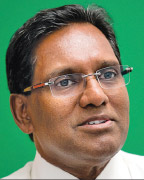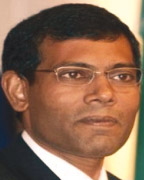Crisis in Maldives
 On Tuesday, Mohamed Nasheed resigned as President of Maldives, his
place being taken by the Stanford-educated Vice-President, Dr. Mohamed
Waheed Hassan Manik. The upheaval was the culmination of weeks of
turmoil, which began on January 16 when Nasheed ordered the military to
arrest Justice Abdulla Mohamed, head of the Maldives Criminal Court. On Tuesday, Mohamed Nasheed resigned as President of Maldives, his
place being taken by the Stanford-educated Vice-President, Dr. Mohamed
Waheed Hassan Manik. The upheaval was the culmination of weeks of
turmoil, which began on January 16 when Nasheed ordered the military to
arrest Justice Abdulla Mohamed, head of the Maldives Criminal Court.
Sri Lanka shares ties of history and ethnicity with the 1,200-island
nation. The Mahawamsa says that ‘Mahiladiva’ or island of women - modern
Malé - was settled by the womenfolk of the companions of Vijaya, the
legendary founder of the Sinhalese. The people of the Dhivehi Raa’je
(‘Island State’) are related to the Sinhalese and Tamils of Sri Lanka
and their language, Dhivehi Bas (‘Island Language’) is a dialect of the
ancient Elu tongue which evolved into modern Sinhala.
Before Maldivian tourism became the money spinner that it is (aided
in its infancy by Sirimavo Bandaranaike’s government), Sri Lanka was its
biggest trade partner, buying the Maldive Fish which made up 95 percent
of its exports.
Judicial system
Notwithstanding the close ties between the two countries, the
government of Sri Lanka has refused, rightly, to intervene - considering
developments as internal matters, while hoping that the problems be
resolved peacefully.
 |
|
Dr Mohamed
Waheed Hassan Manik |
 |
|
Mohamed
Nasheed |
However, it looks like distant Britain has been taking a rather more
than cursory interest in the goings-on in the multi-island republic,
once a ‘Protectorate’ of the British Empire (it had a naval and air base
in the Southern-most Addu atoll until the 1970s).
Indeed, as Nasheed cracked down on Justice Abdulla Mohamed, elements
in Britain’s ruling Conservative Party, including Leader of the Commons
George Young, urged reform of the judicial system. John Glen, Tory MP
for Salisbury, called the judiciary ‘corrupt’.
It is not hard to trace the reasons for the Conservative government’s
concern about Nasheed. Nasheed’s Maldives Democratic Party, like the
Tories and Sri Lanka’s United National Party, is a member of the
International Democratic Union.
Last November, asked which five leaders he would choose to join him
at a stag party organized by former Italian leader Silvio Berlusconi,
Prime Minister David Cameron mentioned Bill Clinton, Obama, Sarkozy, New
Zealand Prime Minister John Key and ‘my new best friend’, Nasheed.
The last named had certainly built up his connections with the
Tories, through a classmate at Dauntsey’s (a 500-year-old Wiltshire
public school), David Hardingham, who founded Minivan Radio, a
pro-Nasheed media organization. Nasheed was backed abroad by ‘Friends of
Maldives’, an NGO formed by Hardingham and stocked with Old Dauntseyans.
Neo-liberal economic policy
At the 2008 Presidential election in which Nasheed came to power, his
Campaign Manager was James McGrath, an Australian former aide to
Conservative Mayor of London, Boris Johnson. The NDP was backed with
extensive funding from Britain’s right-wing Westminster Foundation for
Democracy. Tories Francis Maude, now Minister for the Cabinet Office,
Lord Bates, John Glen MP, Karen Lumley MP and Gary Streeter MP advised
Nasheed.
After becoming President, Nasheed appointed no fewer than five
Britons to advisory and other posts: David Hardingham as Consul in the
UK; Mike Mason, an employee of JP Morgan and Mark Lynas, a journalist,
as Climate Change Advisors; Simon Hawkins, a writer for Minivan Radio,
as Managing
Director of the strategic Maldives Marketing and PR Corporation; and
Paul Roberts as Advisor on International Media and Communications.
The MDP government also began following a neo-liberal economic
policy, privatising most of the national assets - even Malé airport
being given to a foreign company. He also began making inroads into
Maldives’ foreign reserves.
Senior ministers began questioning a policy which weakened national
sovereignty.
Autocratic style
Nasheed began to be perceived in Maldives - rather like Sri Lankan
Opposition Leader Ranil Wickremasinghe - as more interested in the
opinions of foreigners than in domestic needs. This was reinforced by
his support for the illegal Iraq War and his recognition of Israel -
opposed by members of his own government.
This led to the steady rise of the Opposition, led by the former
ruling Dhivehi Rayyithunge Party, which gained ground in last year’s
Local Government elections. The situation was exacerbated by what
members of the government saw as Nasheed’s increasingly autocratic
style.
Following the arrest of Justice Abdulla Mohamed, which the Supreme
Court ruled as illegal and which was also opposed by the Human Rights
Commission and the Judicial Services Commission, the legal profession
began a boycott. This was followed by public demonstrations against the
arrest, leading to the arrest of hundreds of people.
On Monday night, policemen joined the protesters and were fired on
with rubber bullets by the military. Early the next morning, the Army
went over to the Police. Nasheed, confined to Army headquarters,
resigned and Waheed was sworn in as President.
The next day Nasheed was allowed to go free and he promptly led some
2,000 MDP supporters in a demonstration against what he called a ‘coup’.
A warrant was issued for his arrest, after police stations came under
attack, but Waheed has ordered that he not be taken into custody.
The struggle in the Maldives is between sections of the ruling class.
Island politics have been a game of musical chairs among the same feudal
families - except for Nasheed’s predecessor, Maumoon Abdul Gayoom, who
is considered something of a parvenu by the elite.
They are often more at home in Colombo, Singapore or London than in
their own islands, from which they derive their large incomes.
The differences between them are minor; the major parties are
socially and economically conservative, differing only on the extent to
which they are dependent on foreign powers.
What these struggles may do is release the pent-up furies of the less
privileged. The advent of democracy has given these people more of a
voice and it is unlikely that the country will go back to a dictatorial
system. The infighting in the Maldivian ruling elite may yet give the
masses of the Dhivehi Raa’je their day in the sun. |



